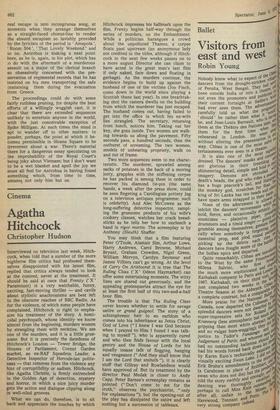Cinema
Agatha Hitchcock
Christopher Hudson
Interviewed on television last week, Hitchcock, when told that a number of the more highbrow film critics had professed themselves disappointed with his latest film, replied that critics always tended to look at the content, never at the treatment. It should be said at once that Frenzy (' X ' Paramount) is a very watchable, funny, exciting, fast-moving thriller — and cavils about stylistic anachronisms are best left to the obscurer reaches of BBC Radio. As for the violence, of which some people have complained, Hitchcock is right to emphasise his treatment of the story. A homicidal psychopath, whose identity we know almost from the beginning, murders women by strangling them with neckties. We see one of the murders, and it is a little gruesome. But it is precisely the datedness of Hitchcock's London — Tower Bridge, the Houses of Parliament, Covent Garden market, an ex-RAF Squadron Leader, a Detective Inspector of Hercule-ian politeness — that removes from the violence any hint of corruptibility or sadism. Hitchcock, like Agatha Christie, is firmly entrenched in the Golden Age of detection, mystery and horror, in which a nice juicy murder gets the action and dialogue clipping along in well-oiled grooves.
What we can do, therefore, is to sit back and appreciate the touches by which Hitchcock impresses his hallmark upon the film. Frenzy begins half-way through the series of murders, on the Embankment. While a politician harangues a crowd about the unpolluted Thames, a corpse floats past upstream (an anonymous lady not credited in the titles, although if Hitchcock in the next few weeks passes on to a more august Director she can claim to have acted in the great man's last film if only naked, face down and floating in garbage). As the murders continue, the evidence .begins to build up against the husband of one of the victims (Jon Finch, come down in the world since playing a Scottish thane last year). In one breathtaking shot the camera dwells on the building from which the murderer has just escaped. The husband comes out, having failed to get into the office in which his ex-wife lies strangled. The secretary, returning from lunch, notices him. Taking out her key, she goes inside. Two women are walking towards us along the pavement. Fifty seconds pass, a hundred seconds, then the outburst of screaming. The two women, models of unhearing propriety, walk on and out of frame.
Two more sequences seem to me characteristic. The murderer, sprawled among sacks of potatoes in the back of a moving lorry, grapples with the stiffening corpse he has packed in among them in order to recover his diamond tie-pin (the same hands, a week after the press show, could be seen fingering a Carolingian pottery jug on a television antiques programme: such is celebrity). And Alec McCowen as the long-suffering detective inspector, sampling the gruesome products of his wife's cookery classe, watches her crack breadsticks as he tells her how to unclench a hand in rigor mortis. The screenplay is by Anthony (Sleuth) Shaffer.
You may think that a film featuring Peter O'Toole, Alastair Sim, Arthur Lowe, Harry Andrews, Carol Browne, Michael Bryant, Graham Crowden, Nigel Green, William Mervyn, Carolyn Seymour and James Villiers can't go wrong. At the level of Carry On Aristocrat it is true that The Ruling Class (` X ' Odeon Haymarket) can offer some entertaining moments. The witty lines are shared out generously, and the appealing grotesqueries attract the eye for at least the first half of this two-and-a-half hour film.
The trouble is that The Ruling Class never knows whether to settle for savage satire or grand guignot. The story of a schizophrenic heir to an earldom wl'io comes into his inheritance as Jesus Christ, God of Love (" I knew I was God because when I prayed to Him I found I was talking to myself "), who is apparently cured and who then finds favour with the local gentry and the House of Lords for his equally insane talk of flogging, hanging and vengeance (" And they shall know that I am the Lord that smiteth it is clearly stuff that Gillray and Rowlandson would have approved of. But its treatment by the director Paul Medak is closer to Andy Capp. Peter Barnes's screenplay remains as pointed (" Don't come to me for the truth," observes the psychiatrist, "only for explanations "); but the opening-out of the play has dissipated the satire and left nothing but a succession of tableaux.












































 Previous page
Previous page